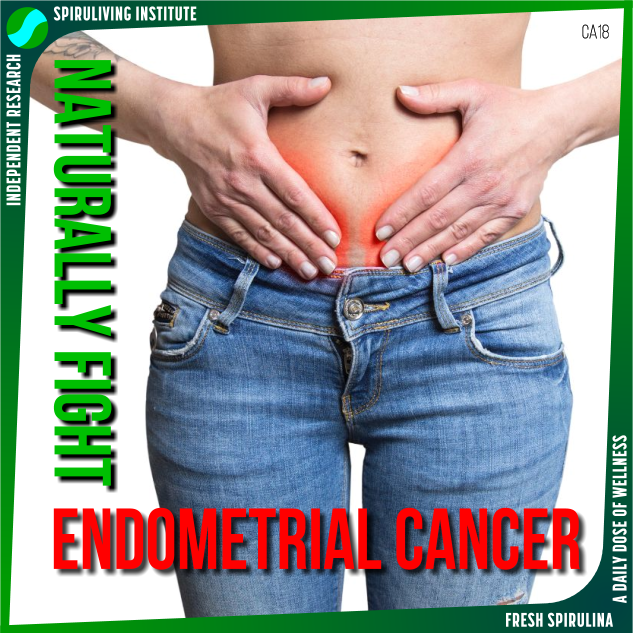
Spirulina Reduces Endometrial Cancer Tumors and Inhibits Metastasis
QUICK SUMMARY
Endometrial cancer (EC) - sometimes called uterine cancer or cancer of the uterus - is the most common gynecological malignancy worldwide.
Advanced endometrial cancer, with aggressive features, has a very poor five-year survival rate of less than 30%, with a high recurrence rate.
THIS RESEARCH
Metastasis is a major challenge in aggressive endometrial cancer treatment accounting for tumor metastasis and the high recurrence risk and poor prognosis.
Spirulina phycocyanin extract (SPE) and its purified products allophycocyanin (APC) and C-phycocyanin (C-PC) - all derived from Spirulina - can be considered a nutraceutical compound with the ability to inhibit tumor growth and metastasis.
The current study aims to investigate the anti-metastatic potential of SPE, and its purified products APC, and C-PC on endometrial cancer both in vitro and in vivo.
PHYCOCYANIN
The main photosynthetic pigment derived from Spirulina is phycobiliprotein (PBP), which is divided into three types, namely phycoerythrin (PE), phycocyanin (PC) and allophycocyanin (APC).
Phycocyanin exhibits a variety of pharmacological effects, such as anti-aging, anti-inflammatory, antioxidant, immunomodulatory, antimicrobial and wound healing properties.
Recent studies have shown that phycocyanin can inhibit the growth and spread of different cancer cells, such as breast cancer, lung cancer, esophageal squamous cell carcinoma, colon cancer.
This research found:
- Phycocyanin inhibits TGFβ1-induced migration of human endometrial cancer cells
- Phycocyanin inhibits TGFβ1-induced expression of EMT markers on human endometrial cancer cells
- Phycocyanin suppressed peritoneal dissemination in vivo
- The safety evaluation of phycocyanin has been confirmed by several studies
Previous studies have also found that phycocyanin strengthens the effect of chemo-or radiotherapy and minimizes dose-related side effects, thereby improving the efficacy of cancer therapy.
Several studies showed that phycocyanin inhibits the capability of migration and invasion of cancer cells.
CONCLUSION
Spirulina phycocyanin extract (SPE) and its purified products allophycocyanin (APC) and C-phycocyanin (C-PC), derived from Spirulina platensis, can be considered a nutraceutical compound with the ability to inhibit Endometrial Cancer tumor growth and metastasis.
Overall, SPE and its efficient components APC and C-PC reversed the EMT through targeting the TGFβ/SMADs signaling pathway, suggesting an effective therapeutic strategy for metastatic endometrial cancer.
Comment from SpiruLiving Institute
1. In this study the research / pharmaceutical sector recognizes that phycocyanins from spirulina - a natural low-cost product - have powerful anti-cancer potential.
2. Phycocyanin is fragile. Dried spirulina can lose up to 90% of its phycocyanin during drying, storage and phycocyanin extraction. Learn more here.
3. Fresh, or fresh-frozen spirulina - never heated and never dried - is by far the richest source of unprocessed pure phycocyanin. This is recently becoming available in many countries.
4. Fresh and fresh-frozen spirulina contains many other active phytonutrients and antioxidants that also show powerful anti-cancer effects - these include beta-carotene, chlorophyl, zeaxanthin, ascorbic acid, 22 different phenols and 11 different flavonoids.
LEARN MORE
Spirulina phycocyanin extract and its active components suppress epithelial-mesenchymal transition process in endometrial cancer via targeting TGF-beta1/SMAD4 signaling pathway
Science Direct
Biomedicine & Pharmacotherapy 2022
SLI-CA18
Spirulina Topics:





